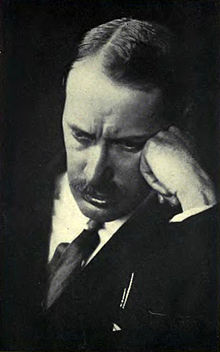Mihály Károlyi
| Mihály Károlyi | |
|---|---|
 |
|
| 1st President of Hungary | |
|
In office 11 January 1919 – 21 March 1919 Acting: 16 November 1918 – 11 January 1919 |
|
| Prime Minister | Dénes Berinkey |
| Preceded by | Position Established |
| Succeeded by | Sándor Garbai |
| Prime Minister of Hungary | |
|
In office 31 October 1918 – 11 January 1919 |
|
| Monarch |
Charles IV Archduke Joseph as Regent |
| President | himself |
| Preceded by | János Hadik |
| Succeeded by | Dénes Berinkey |
| Personal details | |
| Born |
Ádám György Miklós Károlyi de Nagykároly 4 March 1875 Fót, Kingdom of Hungary, Austria-Hungary |
| Died | 19 March 1955 (aged 80) Vence, France |
| Political party | National Independence Kossuth Party |
| Spouse(s) | Katinka Andrássy |
Count Mihály Ádám György Miklós Károlyi de Nagykároly (4 March 1875 – 19 March 1955) was briefly Hungary's leader from 1918 to 1919 during the short-lived First Hungarian People's Republic. He served as Prime Minister between 1 and 16 November 1918 and as President between 16 November 1918 and 21 March 1919.
The Károlyi family were an illustrious, extremely wealthy, Roman Catholic aristocratic family who had played an important role in Hungarian life since the 17th century. Mihály was born in Fót, Austria-Hungary in what is today Hungary. In his youth, he was a wastrel, but as he grew older, he became devoted to more serious pursuits. In 1909, he became the President of the OMGE (National Agricultural Society), the main rural organization of the nobility. Initially a supporter of the existing politico and social system in Hungary, Károlyi gradually became more progressive and left-wing during his career.
In 1910, Károlyi was elected to Parliament as a member of the opposition Party of Independence. During the First World War, Károlyi had started out as supporter of the war, but as the war continued, Károlyi had become the war's most notable critic in Parliament. In 1916 Károlyi broke with his party, which had found him to be too radical, to form a new party, called the United Party of Independence and of 1848, and generally known as the Károlyi Party.
The Károlyi Party was always a weak group with no mass organization and only 20 members in Parliament, most of whom had little serious commitment to the party. Károlyi argued for peace with the Allies, looser ties between Austria and Hungary, abolishing the franchise and language requirements that allowed only 5.8% of the male population to vote and run for office before the war, and giving women the right to vote and hold office. In particular, Károlyi's demand in 1915 that veterans should be granted the right to vote won much popular support while enraging the Prime Minister, Count István Tisza. During the war, Károlyi had made covert contacts with British and French diplomats in Switzerland. In January 1918, Károlyi proclaimed himself a follower of Woodrow Wilson's Fourteen Points.
...
Wikipedia
